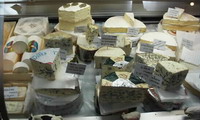Cheese market is ripe for manipulation
Thin trading on cheese market makes it ripe for manipulation, what could affect the price of milk and other dairy products.

The warning from the Government Accountability Office comes as block cheddar cheese reached $1.95 a pound Thursday on the Chicago Mercantile Exchange, up 67 percent from $1.17 a pound a year ago. Industry observers attribute the price surge to strong demand and higher milk prices.
Because cheddar is the benchmark for mozzarella and other cheeses, some big pizza chains, including Yum Brands Inc.'s Pizza Hut and Papa John's International Inc., already have responded by raising their prices.
There are few active cheese traders at the CME and the volume of cheese that changes hands is small, the GAO said, making it susceptible to price manipulation. Less than 2 percent of all cheddar cheese made in the United States is traded at the CME, among only 30 participants, which range from dairy cooperatives to large companies.
The GAO investigation came at the request of several farm-state senators who were concerned about the CME's vulnerability to price distortions.
The agency found that the 1997 transfer of spot cheese trading to the CME, from the National Cheese Exchange in Green Bay, Wisconsin, where allegations of price manipulation also surfaced, resulted in greater oversight by the CME as well as the Commodity Futures Trading Commission.
But otherwise, the structure of the market is largely the same, the report said.
The CFTC has reviewed complaints about cheese price manipulation at the CME, the report said, but those reviews have not resulted in any legal action.
The GAO recommended that the U.S. Department of Agriculture audit the cheese prices companies report in a separate survey to ensure their accuracy. As part of a farm price support program, the department sets a minimum price of unprocessed milk that is based in part on a survey of cheese prices, including the price of cheese traded at the CME.
Sen. Russ Feingold, one of the five senators who requested the study, called on the department to "improve its oversight of the prices it receives in order to better protect our hardworking dairy farmers."
Most cheese in the United States is traded through long-term contracts, which use the CME price as a reference price.
Susan Ruland, a spokeswoman for the International Dairy Foods Association, said her members support the GAO's recommendation that the USDA audit cheese prices and have called for such a move for some time.
The association's members include Kraft Foods Inc., ConAgra Foods Inc. and Dean Foods Co.
Subscribe to Pravda.Ru Telegram channel, Facebook, RSS!




